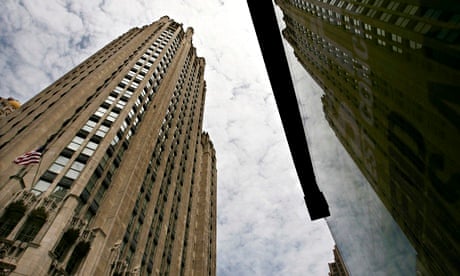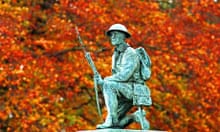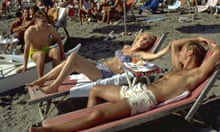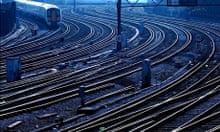Whatever Thomas Wolfe once wrote, you can go home again, even if it's only in your head. I came to England as a student 35 years ago, and stayed, but the books I've written are almost uniformly set in the United States, and two of them in my native Chicago.
It's a place I left as soon as I could, for although visitors cite the friendliness of the natives, the beauty of its skyline and the forthright vigour of the place, I saw only racial tension, violence and fear.
Yet the city had its hooks in too early for me ever to wriggle free. I explored my own childhood in Without Prejudice, the story of two childhood friends, one black and one white, who find their lives dovetailing again 30 years later with tragic consequences. And although my latest book, The Informant, is set largely in other cities, I now find the same pull at work. The next book, another wartime thriller called The Accidental Agent, is again set in the city I cannot seem to forget.
Here are the books that I think best capture my hometown:
1. Sister Carrie by Theodore Dreiser
Dreiser's stylistic ineptitude is legendary – he must be the worst writer to be universally acknowledged as a great novelist. This, his first novel, brilliantly depicts Chicago's 19th-century emergence as the American fount of Mammon, a bustling metropolis of industrial enterprise and greed. The book's eponymous heroine is a country girl who arrives in the city and, bored by the drudgery of her factory job, pursues aspirations that are only achievable through her moral degradation. It's the kind of Faustian bargain Dreiser loves to depict, and like all of his work Sister Carrie is a story of temptation to which Dreiser has all his major characters succumb.
2. The Jungle by Upton Sinclair
Though technically a novel, The Jungle is really a social reformer's investigation into the reality of Chicago's entirely unregulated meatpacking industry. It contains horrific descriptions of working conditions in the stockyards and describes the rampant disregard there for health standards – tubercular beef was commonplace, and sausages often contained as much rat as pork. The book's impact was immediate and practical – the US Congress passed the Meat Inspection Act and the Pure Food and Drug Act in the same year.
3. Twenty Years at Hull House by Jane Addams
A legendary account of private philanthropy to help the victims of a callously indifferent city (and country). Addams was a classic bluestocking whose sense of noblesse oblige may now seem condescendingly de haut en bas, but she and her work helped thousands of people have better lives, and inspired generations of women activists to come .
4. Native Son by Richard Wright
Chicago was the destination for thousands of African-Americans emigrating from the South (like Richard Wright himself). It has always been a racially divided city, with housing and schools so segregated as to constitute an American apartheid, which is vividly portrayed in Wright's novel. Bigger Thomas is the "hero" in this horrific tale of a black man who goes to work for a wealthy white family and accidentally murders their communist-sympathising daughter. James Baldwin famously remarked that there was a Bigger Thomas in all American black men, waiting to explode; equally, white American men had a long history of punishing black men who broke a deep racial and sexual taboo. But the novel is never a mere tract, especially in its riveting study of how an apparently strong and decent man becomes both a villain and a victim.
5. Chicago: City on the Make by Nelson Algren
Nelson Algren was a kind of midwestern Charles Bukowski. Obsessed with lowlife, he nevertheless became the lover of Simone de Beauvoir (and, equally improbably, nicked my grandmother's opera glasses). Best known for his novels, The Man with the Golden Arm and A Walk on the Wild Side, this essay is in fact a stronger piece of work, since it features the character he loved and hated most – Chicago. Its lyric revelling in the city's brutal side infuriated Chicago chauvinists, but reads fresh and sharp and true to this day.
6. The Adventures of Augie March by Saul Bellow\
The novel that put Bellow on the map, after two modest novels (Dangling Man and The Victim) which he later derided for their imitation of European literary models. From its opening salvo there is nothing continental about Augie March: "I am an American, Chicago born – Chicago, that somber city – and go at things as I have taught myself, free-style, and will make the record in my own way … " Rarely has a voice declared itself with such sheer oomph – it's the 20th-century version of "Call me Ishmael".
7. Letting Go by Philip Roth
Unlike Bellow, Roth moved fast out of the gates from the start. Much of the novel takes place at the University of Chicago, which then sat like a rarefied island of abstract thought (it has more Nobel prize winners than any other American university) on Chicago's southside, surrounded by black ghetto on three sides and Lake Michigan on the fourth. In its ruthless depiction of his academic hero's colleagues, the novel shows Roth at his most scathingly satirical. Graham Greene famously remarked that all novelists need a chip of ice in their hearts; Letting Go suggests Roth has a freezer in his.
8. Endless Love by Scott Spencer
The movie version of the novel – a combination of Zeffirelli schmaltz, Brooke Shields, and a theme tune that can be heard in elevators across the world – has relegated this remarkable book to undeserved obscurity. For although most "tragic" love stories remind me of Oscar Wilde's dictum about Little Nell, this is the exception. It's the story of Chicago teenager David Axelrod who lives in the city's famously liberal Hyde Park. David falls in love with a local girl, Jade Butterfield – and with her family who, embodying the kind of socially tolerant views the neighbourhood has always been famous for, invite him to live with them. But growing alarmed by David's intensity, Jade's father suddenly puts a halt to the affair. In a madcap scheme, David then accidentally burns down the Butterfield house and is sent to a mental institution. On release, he is reunited with Jade, only for catastrophe to strike a second time. A heartbreaking novel no synopsis can stand in for. Read it.
9. The House on Mango Street by Sandra Cisneros
It's not really a novel as we know it, but a series of evocative vignettes told through Latino eyes. A teenage girl describes life in her Mexican-American neighbourhood in Chicago, where the barrio is more barrier than comfort. Controversial (because of its harsh criticism of the sexism in her community), evocative and moving, these "lazy poems", as the author calls them, form a modern-day treatment of a Chicago speciality – the arrival and gradual assimilation of an immigrant community.
10. The Death of the Detective by Mark Smith
Although nominated for a National Book award when it was published in 1975, this novel remains a much undervalued classic. A retired detective Arnold Magnuson gets drawn into the search for a serial killer who may be linked to a suppressed scandal from years before. Magnuson's labours take him all over a city that he finds bewilderingly changed. Tense and strongly plotted, full of memorable characters, this novel nonetheless stands out for the calibre of its writing. Its descriptions of Chicago are even better than Bellow's, and for its prose alone it should live as long as any of the books on this list.









Comments (…)
Sign in or create your Guardian account to join the discussion